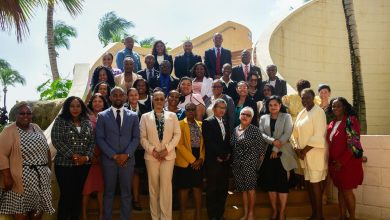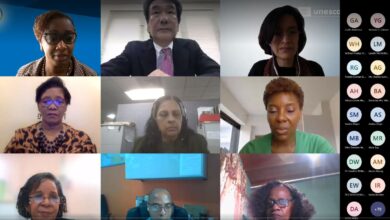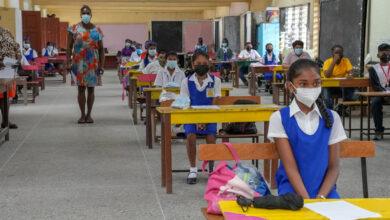A call was made by Minister of Education Dr. Rupert Roopnaraine, for more efficient sharing of information and ideas on the challenges facing the education systems across the Caribbean.
Minister Roopnaraine, addressing the opening of the Twenty-Seventh (27th) Meeting of the Council for Human and Social Development (COHSOD) at the CARICOM Secretariat this morning, noted that despite its relative success in specific areas such as health and sport, functional cooperation in education at the Regional level has had severe limitations.
He said that this has to do with how member states effectively manage development related research at the national and regional levels. He noted that as a consequence, the effective development of the region’s human resource has been severely hampered.
Giving an example, the Minister explained that the lessons of the reformed Trinidadian and Jamaican education systems would no doubt be invaluable as Guyana undertakes planned reform of its education system. “Yet there is no established regional mechanism via which my research development and planning personnel can readily access those findings,” Minister Roopnaraine stated.
Shortly after his assumption to office, Minister Roopnaraine commenced a comprehensive audit of the school system. This is a precursor of what is to be an extensive Commission of Inquiry into the state of education locally.
Roopnarine noted too that Information Communication Technology (ICT) development is an inexorable link to the concept of regional research integration. He pointed that the nature of ICT at present, represents a tremendous opportunity for CARICOM but, challenges such as the wide disparity in bandwidth availability still exist. He said that this is one hurdle that the region must seek to overcome with some urgency.
Guyana’s education minister also addressed the need for human resource development. “We have so far failed to developed a holistic regional mechanism incorporating the human resource talent of the Diasporas in any sustainable meaningful way,” the Minister pointed out. He said that “whilst as a region we might not be able to immediately offer competitive remuneration, there is room for innovatively engaging our Diasporas either by new initiatives, or the restructuring of existing systems.” He listed the US Full Bright Scholarship and the Peace Corps among others as examples of bilateral and multilateral initiatives that perhaps could be guided by a coordinated policy of Diaspora involvement.

responsible for education and child issues at the opening of the
Twenty-Seventh Meeting of the
Council for Human and Social Development
at the Caricom Secretariat, Georgetown
The Education Minister expressed his disappointment at the absence of culture as a specific related agenda for the meeting. “It is time we seek to truly mainstream cultural development as against being relegated to a mere afterthought,” he urged.
The Twenty-Seventh Meeting of COHSOD is a two-day event that will run under the theme ‘Safeguarding our region’s future, reshaping education for the twenty-first century”. The main objective of the meeting is to provide an opportunity for Ministers responsible for Education and Children’s Issues, to discuss perspectives, and provide directions on the major issues related to the development of a proposed 2030 CARICOM Strategy for Education and Human Resource Development.
Speakers at the opening ceremony also included Chairman of the Meeting, Deputy Prime Minister and Minister of Education, Youth, Sport, and Culture, St. Kitts and Nevis Shawn Richards, and Assistant Secretary-General, Human and Social Development, CARICOM Secretariat, Dr. Douglas Slater.
Richards explained the rationale for the development of a proposed 2030 CARICOM Strategy for Education and Human Resource Development and it being on the agenda of the twenty-seventh meeting. “The Caribbean community has had an impressive history in such areas as education, health, youth development, in which member states of the community have pooled technical resources to produce regional public good for the benefit of all instead of pursuing restricted national options,” he said. “This no doubt, was the perspective of the Conference of CARICOM Heads of Government when they decided that a holistic CARICOM 2030 Human Resource Development Strategy should be developed, as the region seeks to safeguard the future through the reshaping of education for the 21st century,” he furthered.
Richards explained that among the specific issues engaging the Heads of Government in arriving at the decision were, the indications of systemic failure evidenced by the regional results of the Caribbean Examination Council examinations, which pointed to the fact that even in light of the significant expenditure in education budgets, there were significant wastage and considerable inefficiency at all level.
Richard noted that despite most member states recording close to Universal Access to Secondary Education, only 40 percent of those students actually sat the examinations, and among those only 22 percent achieved acceptable grades in 5 or more subjects. There was also low participation in areas more directly related to development for the 21st century and the strategic areas outlined for the regions such as foreign languages, Caribbean history, geography, art, music, science and technology, Richard explained. The need for rationalisation of tertiary education was also an issue cited.
The strategy is expected to pay specific attention to equity, addressing the imperative of quality, improving performance with gender and socio-economic sensitivity, creating sustainable efficiency to guarantee the future and aligning and rationalizing higher education to address Caribbean innovational entrepreneurship and development, he said.
During the meeting the ministers are expected to examine the strategy and make recommendations. “The challenge is ours to continue to shape the future we want, not only for ourself and our children, but for several generations to come,” Slater urged.
He explained that even as it charts a new direction in education, the COHSOD meeting will also review the advances through functional cooperation with member states in areas such as addressing adolescent pregnancy. It will also consider for endorsement, CARICOM’s strategy for reducing adolescent pregnancy which was developed in partnership with the UNFPA. The role of the education system in building regional spirit and identity will also be examined, as well as the WI Cricket Board’s kiddies cricket as part of kindling interest in cricket, among others.







